 The New York Knicks' Carmelo Anthony is the child of an African-American mother and was named after his Puerto Rican father. "I'm still trying to get that message out there, to let them know that I'm one of them and part of that community, too," he told ESPN Deportes about his Latin roots.
The New York Knicks' Carmelo Anthony is the child of an African-American mother and was named after his Puerto Rican father. "I'm still trying to get that message out there, to let them know that I'm one of them and part of that community, too," he told ESPN Deportes about his Latin roots.  "My mother is very tough," Halle Berry told The New York Times in 2002. "She taught me when I was little that I'm her daughter, I'm half white, but when you leave this house people will assume you're black and you'll be discriminated against. So accept being black, embrace it. She said if I fight it, I will have a battle with them and a battle inside myself."
"My mother is very tough," Halle Berry told The New York Times in 2002. "She taught me when I was little that I'm her daughter, I'm half white, but when you leave this house people will assume you're black and you'll be discriminated against. So accept being black, embrace it. She said if I fight it, I will have a battle with them and a battle inside myself." 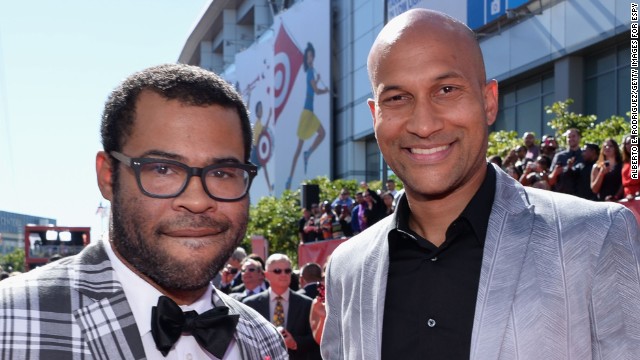 Comedians Jordan Peele, left, and Keegan-Michael Key have a popular Comedy Central show, which often pokes fun at mistaken identities. "Jordan and I have an African-American way of looking at things but also a child-of-a-white-mother way of looking at things," Key told USA Today in 2012. "We have a very different and distinct filter that we see the world through that other people don't, because we're hybrids."
Comedians Jordan Peele, left, and Keegan-Michael Key have a popular Comedy Central show, which often pokes fun at mistaken identities. "Jordan and I have an African-American way of looking at things but also a child-of-a-white-mother way of looking at things," Key told USA Today in 2012. "We have a very different and distinct filter that we see the world through that other people don't, because we're hybrids." 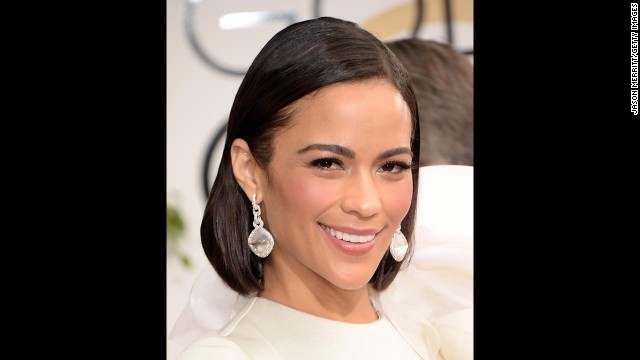 Actress Paula Patton, born to a white teacher and black defense attorney, told Women's Health magazine that she considered the term "biracial" offensive: "It's a way for people to separate themselves from African-Americans ... a way of saying 'I'm better than that,' " she said in 2010. "I'm black because that's the way the world sees me. People aren't calling Barack Obama biracial. Most people think there's a black president."
Actress Paula Patton, born to a white teacher and black defense attorney, told Women's Health magazine that she considered the term "biracial" offensive: "It's a way for people to separate themselves from African-Americans ... a way of saying 'I'm better than that,' " she said in 2010. "I'm black because that's the way the world sees me. People aren't calling Barack Obama biracial. Most people think there's a black president."  Super Bowl XL MVP Hines Ward is African-American and Korean. "I'm proud to be a Korean, that's something when I was little as a kid, I was ashamed of," he said in a news conference on a visit to South Korea.
Super Bowl XL MVP Hines Ward is African-American and Korean. "I'm proud to be a Korean, that's something when I was little as a kid, I was ashamed of," he said in a news conference on a visit to South Korea.  Actress Michael Michele was born in Indiana to a black mother and a white father. "I am assertive and independent, that's just the way I was raised," she told the Los Angeles Times in 1999. "I have two brilliant parents. ..."
Actress Michael Michele was born in Indiana to a black mother and a white father. "I am assertive and independent, that's just the way I was raised," she told the Los Angeles Times in 1999. "I have two brilliant parents. ..."  Kid Cudi's parents are black and Mexican, and he told MTV that he created the alter ego Juan Pablo as a nod to his Mexican roots.
Kid Cudi's parents are black and Mexican, and he told MTV that he created the alter ego Juan Pablo as a nod to his Mexican roots.  TV personalities Tamera Mowry-Housley and Tia Mowry-Hardrict grew up in the spotlight. When Mowry-Housley was criticized for her marriage to a white man, she was emotional on "Oprah: Where are they now?" "My mom is a beautiful black woman and my dad is an amazing white man, and I grew up seeing a family," Mowry-Housley said.
TV personalities Tamera Mowry-Housley and Tia Mowry-Hardrict grew up in the spotlight. When Mowry-Housley was criticized for her marriage to a white man, she was emotional on "Oprah: Where are they now?" "My mom is a beautiful black woman and my dad is an amazing white man, and I grew up seeing a family," Mowry-Housley said.  Colin Kaepernick is adopted. His birth father is black and his birth mother is white. Asked by Time.com if he ever questioned his racial identity, he responded: "I did what I did. It wasn't necessarily, 'I'm black so I have to act a certain way.' Or, 'I'm with a white family, I have to act a certain way.' My parents just kind of let me be me."
Colin Kaepernick is adopted. His birth father is black and his birth mother is white. Asked by Time.com if he ever questioned his racial identity, he responded: "I did what I did. It wasn't necessarily, 'I'm black so I have to act a certain way.' Or, 'I'm with a white family, I have to act a certain way.' My parents just kind of let me be me."  Actress and author Karyn Parsons' mother is black and her father is white. "When I saw (President Obama's) speech on race, I cried and I felt like, there's the speech I've been wanting to write. I've been thinking about writing about race for a long time," she told Essence magazine in 2008. Her foundation, Sweet Blackberry, highlights stories of black history in DVD's for children.
Actress and author Karyn Parsons' mother is black and her father is white. "When I saw (President Obama's) speech on race, I cried and I felt like, there's the speech I've been wanting to write. I've been thinking about writing about race for a long time," she told Essence magazine in 2008. Her foundation, Sweet Blackberry, highlights stories of black history in DVD's for children.  Novelist Walter Mosley's mother was white and Jewish from Poland; his father was a black American. "A lot of people would say to me, 'Well, you're multiracial.' And I am. But in this society, I'm black. That's not my color, but that's how I'm seen by others," he said to USA Today in 1999.
Novelist Walter Mosley's mother was white and Jewish from Poland; his father was a black American. "A lot of people would say to me, 'Well, you're multiracial.' And I am. But in this society, I'm black. That's not my color, but that's how I'm seen by others," he said to USA Today in 1999. 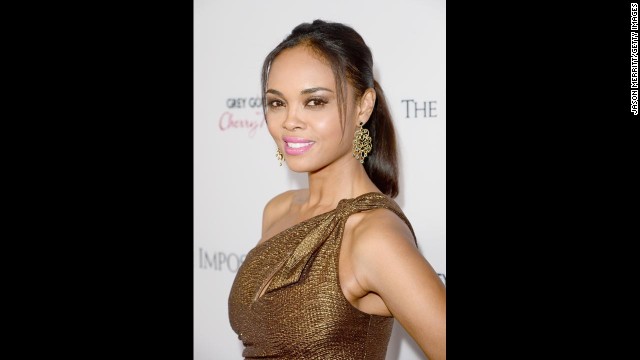 Actress Sharon Leal is the daughter of a Filipino mother and African-American father. "I think when you look at me it's glaringly obvious that I'm black and for some reason Asian doesn't exactly scream out at you," she told BET.com. "And I definitely identify with my African-American side more. That's how people perceive me and I'm fine with that."
Actress Sharon Leal is the daughter of a Filipino mother and African-American father. "I think when you look at me it's glaringly obvious that I'm black and for some reason Asian doesn't exactly scream out at you," she told BET.com. "And I definitely identify with my African-American side more. That's how people perceive me and I'm fine with that." 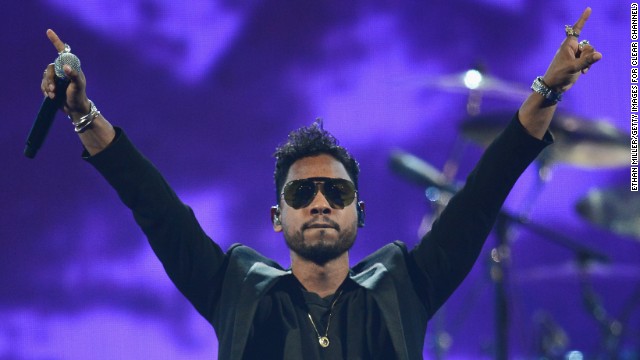 "I'm Mexican and black -- my father is Mexican, my mom is black. I've been in the middle my entire life, having to make decisions as to who and what I am," singer Miguel told Billboard magazine. "It was really important for me to stand out. I wanted the music to stand out that way."
"I'm Mexican and black -- my father is Mexican, my mom is black. I've been in the middle my entire life, having to make decisions as to who and what I am," singer Miguel told Billboard magazine. "It was really important for me to stand out. I wanted the music to stand out that way."  Singer Amerie's father was an American soldier who met her mother when he was stationed in Korea. "I was never made to feel that I was 'different' by other kids," she told the Daily Mail in 2007. "But people would still ask me, if you had to choose one ethnicity, which would it be? I'd be, like, why do I have to come down on one side or the other? I get that people love to categorize, but I think we get a little too hung up on it sometimes."
Singer Amerie's father was an American soldier who met her mother when he was stationed in Korea. "I was never made to feel that I was 'different' by other kids," she told the Daily Mail in 2007. "But people would still ask me, if you had to choose one ethnicity, which would it be? I'd be, like, why do I have to come down on one side or the other? I get that people love to categorize, but I think we get a little too hung up on it sometimes."  Actor Shemar Moore calls himself biracial. "I am well aware, especially in this country, that I am perceived and viewed as a black man because of the color of my skin. I am extremely proud to be black and of my heritage," he writes on his website. "Yet I am just as proud to embrace the white side of me. In a perfect world, my wish is for people to see past color stereotypes and simply look at the character and personality of a person."
Actor Shemar Moore calls himself biracial. "I am well aware, especially in this country, that I am perceived and viewed as a black man because of the color of my skin. I am extremely proud to be black and of my heritage," he writes on his website. "Yet I am just as proud to embrace the white side of me. In a perfect world, my wish is for people to see past color stereotypes and simply look at the character and personality of a person."  Actress Tracee Ellis Ross is the daughter of singer Diana Ross and music manager Robert Ellis Silberstein. "According to the casting world, I'm a black actress," says Ross. "But I always say that I'm a woman of color - several colors, because I'm black and Jewish. And that's been a great blessing in my life."
Actress Tracee Ellis Ross is the daughter of singer Diana Ross and music manager Robert Ellis Silberstein. "According to the casting world, I'm a black actress," says Ross. "But I always say that I'm a woman of color - several colors, because I'm black and Jewish. And that's been a great blessing in my life."  Actor Boris Kodjoe grew up in Germany and moved to America when he was 19 years old. "To not consider somebody black because they're biracial is a little bit short-minded. I'm biracial. I was born to a white mother from Germany and a black father from Ghana. And I represent both cultures," he told BET.com in 2012. "But at the end of the day, when I walk the Earth, I walk the Earth as a black man. That's what I'm being perceived as, that's what I look like and that's what I feel like."
Actor Boris Kodjoe grew up in Germany and moved to America when he was 19 years old. "To not consider somebody black because they're biracial is a little bit short-minded. I'm biracial. I was born to a white mother from Germany and a black father from Ghana. And I represent both cultures," he told BET.com in 2012. "But at the end of the day, when I walk the Earth, I walk the Earth as a black man. That's what I'm being perceived as, that's what I look like and that's what I feel like." 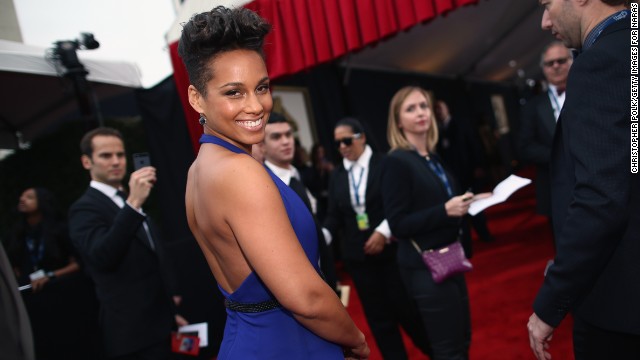 Singer Alicia Keys' mother is mainly of Italian heritage and her father is black. "My background made me a broad person, able to relate to different cultures," she told The Observer in 2003. "But any woman of color, even a mixed color, is seen as black in America. So that's how I regard myself."
Singer Alicia Keys' mother is mainly of Italian heritage and her father is black. "My background made me a broad person, able to relate to different cultures," she told The Observer in 2003. "But any woman of color, even a mixed color, is seen as black in America. So that's how I regard myself."  Actress Stacey Dash, known for her role in the movie "Clueless," is of African-American, Barbadian and Mexican descent. She made headlines for her endorsement of Republican presidential candidate Mitt Romney.
Actress Stacey Dash, known for her role in the movie "Clueless," is of African-American, Barbadian and Mexican descent. She made headlines for her endorsement of Republican presidential candidate Mitt Romney.
- Professor Martha Jones sparks debate about how we identify black Americans
- "The language of race has always been a moving target," she writes
- Jones: Listen to what people call themselves for guidance on how to address them
Editor's note: Martha S. Jones is a professor of history, law and Afro-American and African studies at the University of Michigan. She wrote a previous piece that explored her journey identifying as both biracial and black. Join her for a live Google Plus Hangout at 6 p.m. ET Monday about the evolving identity of African-Americans.
(CNN) -- When the census listed Negro as a race option in 2010, a controversy erupted.
My students at the University of Michigan were eager to denounce the term's use: "Negro? It has to go!"
To their ears, "Negro" was derogatory, too close in tone to the other, more infamous n-word. I played devil's advocate, to test their thinking: "But some black elders still self-identify as Negroes." "It's preferable to its predecessor, colored."
"Don't some of you belong to the National Council of Negro Women chapter?"
I could not shake their thought.
I was confronting a generational divide. For my grandmother, "Negro" was a term of respect. To my students, it was an epithet.
'Negro' on form draws ire of prospective juror in New York
It's no surprise that we feel unsettled when a new language of identity takes over the old. The language of race -- constructed variously in science, law, politics and culture -- has always been a moving target, and we aren't the first generation to confront it.
 Mother of biracial kids: Talk about race
Mother of biracial kids: Talk about race  Biracial girl says I do not 'feel black'
Biracial girl says I do not 'feel black'  Mistaken as a white person
Mistaken as a white person  Growing up with racism
Growing up with racism My CNN essay "Biracial and also black" generated a debate about the words we use to describe African-Americans. I called myself mixed-race, a phrase that includes identities rooted in multiple races.
Another term, biracial, some readers pointed out, assumes one identity borne out of two. It is, perhaps, too narrow for a discussion about identity in the 21st century.
Some readers also rejected the phrase "African-American," deeming it awkward and inaccurate. Renee wrote: "We are not from Africa, I was born here in the U.S. I don't know anyone there, can't even say my ancestors are from there."
Those who defended the use of African-American noted it was rooted in history, culture and personal choice. Others offered up alternatives, like "person of color," "black," "halfrican-American" and "mutt."
Some just preferred using a simple description: "human."
Words seem to fail us, even as they are all we have.
The debate from my essay illustrates how difficult it can be when we rely on linguistic conventions to express the complexity of human identities.
Even so, there are words that have fallen out of favor. No reader seriously proposed that I use a term like mulatto or quadroon instead of mixed-race.
In the 19th and early 20th centuries, these terms were widely used. Many of my paternal forebears were marked with an "M" or "Mu" for mulatto in census records.
Did they identify with this label? I cannot say for sure. But I do know that it was imposed upon them.
Until 1960, census enumerators chose the race. Someone had sized up my ancestors and decided they were mixed.
Among black Americans, ideas about the language of self-identification have changed over time.
In the early 19th century, black leaders also debated what names to give their religious and political organizations.
In the end they split. Churches adopted the term "African," as in the African Methodist Episcopal Church. Political organizations opted for "Colored," as in the Colored National Convention of 1848. And while we often refer to it as the NAACP, the nation's oldest civil rights organization has kept the word "colored" in its name long after it has left common parlance.
By the early 20th century, the term "Negro" gained traction.
The National Negro Business League was founded in 1900, and in 1914, Marcus Garvey founded the United Negro Improvement Association.
In 1971, the Congressional Black Caucus was formed. Its name suggested how the civil rights and black power movements left behind terms like African, colored and Negro.
Sometimes, shifts in language happen before our eyes. I can recall when The Journal of Negro History became The Journal of African American History.
I finally told my students a story, hoping they might see the generational dynamics that drive the language of race.
One afternoon, my paternal grandmother, Susie Jones, escorted nursery school children to a hospital clinic in her hometown of Greensboro, North Carolina.
When she approached the registration clerk she was asked her name. Her response: "My name is Mrs. Jones."
"We do not call Negroes by titles," the clerk shot back. My grandmother explained that she would be uncomfortable were the clerk to use her first name. "I will call you what you wish. I can't let you be more polite than I," the clerk conceded.
My grandmother was a black woman, the clerk was white, and it was the early 1950s.
The clerk used the term "Negro," and to this my grandmother did not object. For her, Negro was the preferred term. The alternative -- "colored" -- was demeaning.
But who was entitled to the honorific "Mrs."?
Both my grandmother and the clerk knew that to address a black woman by her first name was part of a racial etiquette reserved for white women with the status that "Mrs." conveyed.
My students could see how, like them, my grandmother had insisted upon her own self-definition even when others tried to apply different labels.
The lesson they took away was how, when we listen to others, we may learn how they prefer to be addressed, spoken of and categorized.
And that understanding is one step toward human dignity.
How do you self-identify? Has that changed over your life? Share your experiences in the comments, on Twitter @CNNLiving or on CNN Living"s Facebook page .
No comments:
Post a Comment